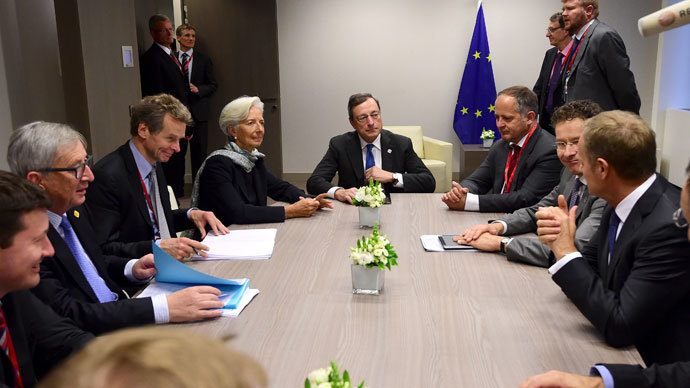Brussels: A bloody-minded ‘blob’ of costly dysfunction

Given how government leaders seem to spend much of their lives in Brussels, isn’t it about time they concentrated on running their own countries?
Indecision is the enemy of progress. In an era of political
pygmies at the tip of the EU behemoth, it is an embarrassing
comedown to see the cradle of Western civilization reduced to
something akin to an insecure schoolgirl taking the faltering
first steps towards an adolescent wardrobe on a slow Saturday
afternoon at the mall.
It is quite credible to argue that Europe lost the plot decades
ago - the last time the French managed to balance their budget
was 1974, for instance. Since then, the dizzying ways of the EEC
- a pleasant notion of a trading bloc - has given way to the
pomp, the circumstance, and ultimately the incompetent, corrupt,
bloody-minded dysfunction of the EU...which neither incorporates
all of Europe, nor is actually a union largely because few
citizens endorse such a silly, centrally planned venture. Not
that Brussels notices, as every problem is met with a call for
‘ever greater union’ - a process that has never resolved
anything.
Thus, nation states still retain considerable power, despite
Brussels’ many intrusions into everyday life. Despite the central
dictats of Brussels delivering more red tape and little or no
benefit to citizens, national governments still have rather a lot
to do. However, in recent weeks ordinary citizens have been left
pondering the effectiveness of the blob. Barely a week goes by
without national leaders, finance ministers and vast retinues of
bureaucrats zooming to Brussels to discuss (and never it seems,
resolve) a dizzying assortment of European problems. The ‘crisis’
list is now so long, there is barely time to discuss Britain’s
quest for more ‘EU efficiency’ (how oxymoronic is that?).
Frankly, I am not terribly upset to hear of occasional Brussels
dinners where ministers gather and chew the cud over a fine glass
of French red accompanied by a splendid cheese with the lure of a
good Cognac. However, when, as with the current Greek charade,
the result is seemingly endless back-to-back meetings
concentrated around fine food and wine, it does feel a bit as if
the Bourbons are back in town. Come to think of it, French
Royalty used to allow some paying spectators the pleasure of
watching the court dine. At least if Brussels sold a few tickets
to see President Juncker liberally disperse EU assets, it might
partially defray dining costs.
However, the conspicuous consumption of the EU mechanism in
calorific terms is merely one element of a complex and costly
jigsaw. Fly into any summit-hosting city and the national airport
is awash with privately chartered jets or national showpieces
sitting motionless, while elsewhere government officials imbibe,
discuss and - this is the EU after all - fail to achieve anything
(apart perhaps from indigestion).
The chronic waste of national resources in attending endless
summits is hardly speeding processes up either. Nobody has agreed
anything with Greece, and any vaguely seasoned analyst could have
foreseen such an outcome months ago. Even some EU governments
have been wisely noting the blithe disregard for time and money:
Finland’s Finance Minister Alex Stubb referred to one of the many
Greek ‘crisis’ meetings recently as “a waste of air miles.”
Ultimately, the discussion about government waste appears to have
been buried deep in the bureaucratic bowels of the blob itself.
However, after five years of semi-endless bailouts, the EU is now
lurching from crisis to crisis on a more regular basis than ever.
Moreover, the ancient regime of analogue centralism is draining
valuable resources from the nation states. Voters elected their
government to run their countries, not to spend endless time
trying to pin square pegs in round holes to enable the
continuation of an exhausted European project, which, culinary
virtues notwithstanding, is ideologically, morally, financially
and organizationally bankrupt.
Back in the day, the elites used to send ‘seconds’ to stand in
for them at nebulous meetings. EU governments would be well
advised to send, say, their gardeners with a mandate to just say
no to future summits, unless, or until, the EU has an outbreak of
management. Otherwise national governments face being effectively
decapitated through prime ministerial absence at endless, futile,
‘crisis summits.’
At least, we might get a Greek resolution soon thanks to Mr
Tsipras calling for a referendum, but then again who is paying
for that?
The statements, views and opinions expressed in this column are solely those of the author and do not necessarily represent those of RT.
The statements, views and opinions expressed in this column are solely those of the author and do not necessarily represent those of RT.













